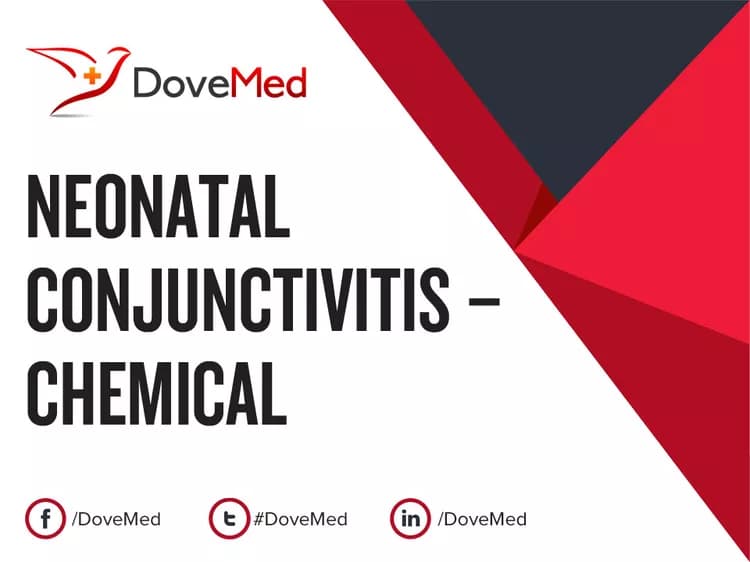What are the other Names for this Condition? (Also known as/Synonyms)
- Chemical Conjunctivitis of the Newborn
- Newborn Conjunctivitis - Chemical
- Toxic Conjunctivitis
What is Neonatal Chemical Conjunctivitis? (Definition/Background Information)
- Neonatal Conjunctivitis can be a severe disorder that occurs shortly after delivery in newborns (within 30 days). It may be caused due to bacterial, viral microorganisms, or even on exposure to certain chemical substances (which is quite infrequent)
- Chemical Conjunctivitis in the Newborn child is caused by eye irritation that results when certain eye drops (containing silver nitrate) are administered. The eye drops are given to prevent formation of Neonatal Conjunctivitis caused by certain infectious bacteria, which the child gets exposed to during delivery
- This condition is non-acute, and subsides spontaneously within a 2-4 days. Treatment is generally not required and the eyes are not damaged in any manner
- Conjunctivitis is inflammation of conjunctiva of the eye, which is the membrane covering the white region of the eye
- In Conjunctivitis the white part of the eye turns red or pink, and hence it is known as Pink Eye. The infection may affect either one, or both the eyes, and is accompanied by inflammation, irritation, with watery discharge from the eyes. Under normal circumstances, Conjunctivitis does not affect vision. Chemical Conjunctivitis of the Newborn is not infectious
Who gets Neonatal Chemical Conjunctivitis? (Age and Sex Distribution)
- Newborn babies, who are administered eye drops (containing silver nitrate or other such chemicals), immediately after birth to prevent bacterial infection. Only a small percentage of children develop Chemical Conjunctivitis of the Newborn
- Both male and female genders are equally affected
What are the Risk Factors for Neonatal Chemical Conjunctivitis? (Predisposing Factors)
The risk factor for Chemical Conjunctivitis of the Newborn includes:
- Administering eye drops to the newborn child, containing silver nitrate. This was an earlier practice and is now almost eliminated in US & European countries
It is important to note that having a risk factor does not mean that one will get the condition. A risk factor increases ones chances of getting a condition compared to an individual without the risk factors. Some risk factors are more important than others.
Also, not having a risk factor does not mean that an individual will not get the condition. It is always important to discuss the effect of risk factors with your healthcare provider.
What are the Causes of Neonatal Chemical Conjunctivitis? (Etiology)
- Chemical agents such as silver nitrate, once used to be a component of antibiotic eye applications, which were previously used to treat bacterial forms of Neonatal Conjunctivitis
- This led to development of the non-infectious Chemical Conjunctivitis; a condition that lasts less than a week in the just born babies. Hence, it is being increasingly replaced by better alternatives (like erythromycin)
What are the Signs and Symptoms of Neonatal Chemical Conjunctivitis?
Common signs & symptoms of Chemical Conjunctivitis of the Newborn are:
- Tenderness, inflammation, and redness of the eye(s)
- Watery drainage from the eyes
- The onset of symptoms occur in normal cases, from day one
How is Neonatal Chemical Conjunctivitis Diagnosed?
Chemical Conjunctivitis of the Newborn is diagnosed using the following tools:
- The ophthalmologist or physician performs an eye examination, evaluates the child’s medical history, and the time period for onset of symptoms in the newborn child is observed (this factor could often be conclusive)
- Slit lamp exam (if necessary), for a detailed study of the eye
- Blood, chocolate agar, tissue culture to rule out infectious cause
- Examination of conjunctival scrapings; culture to rule out infectious cause
- Differential diagnosis of other types of conjunctivitis should be considered, in order to eliminate other eye conditions
Many clinical conditions may have similar signs and symptoms. Your healthcare provider may perform additional tests to rule out other clinical conditions to arrive at a definitive diagnosis.
What are the possible Complications of Neonatal Chemical Conjunctivitis?
Complications may arise if the cornea is involved, or if there is a late recognition of the condition, leading to a delayed treatment. However, with Chemical Conjunctivitis, such developments are very unusual. There are no complications observed in a majority of the cases.
How is Neonatal Chemical Conjunctivitis Treated?
Management measures for Chemical Conjunctivitis of the Newborn include:
- Chemical Conjunctivitis resolves spontaneously within a few days (2-4 days), and no treatment may be required
- Use of lubricating eye drops can help soothe the eyes
- Application of warm compress can help reduce discomfort
- Follow-up care is required, only if the condition aggravates
How can Neonatal Chemical Conjunctivitis be Prevented?
- Avoid using eye drops containing silver nitrate
- Nowadays, the incidence of Chemical Conjunctivitis of the Newborn has become a rarity; due to the development of better quality eye drops that does not cause any irritation to the eyes of a newborn child
What is the Prognosis of Neonatal Chemical Conjunctivitis? (Outcomes/Resolutions)
- Most cases of non-acute (mild) Chemical Conjunctivitis of the Newborn, are self-limiting and have an excellent outcome; even in the absence of any supportive management
Additional and Relevant Useful Information for Neonatal Chemical Conjunctivitis:
- The use of anti-bacterial eye drops containing sliver nitrate is diminishing around the world. Currently, in most geographical regions, chloramphenicol and neomycin are increasingly being used
- It has to be understood that neglecting to administer anti-microbial eye drops (or the use of improper, inadequate eye drops by the healthcare provider), in the period immediately following birth of the child, could risk the child to acute Bacterial Conjunctivitis
Related Articles
Test Your Knowledge
Asked by users
Related Centers
Related Specialties
Related Physicians
Related Procedures
Related Resources
Join DoveHubs
and connect with fellow professionals


0 Comments
Please log in to post a comment.